The ‘hoodies’, the ‘suits’ and others behind Chicago Government 2.0
By Elliott Ramos

The ‘hoodies’, the ‘suits’ and others behind Chicago Government 2.0
By Elliott Ramos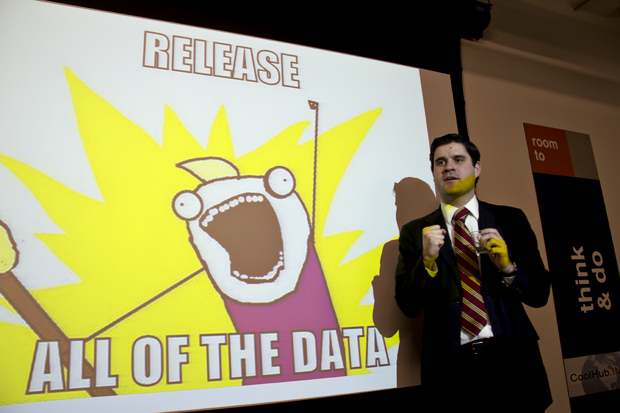
If you’re the type bent toward more sunlight on governmental decision-making, you’ve probably been smiling a bit lately.
Over the past two years, the city’s released names of lobbyists, government contracts and receipts by the millions.
If you’re so inclined, you can now peer into the inner-workings of government exchanges, including gifts, which would be as seemingly insignificant as cookies or bath salts. Or, you can peruse the following: food inspections, overtime expenditures, salaries of every city employee, building permits, building violations, and ridership numbers for trains and buses, among other things.
And headlines confirm the trend’s continuing. Last month, Chicago won a $1-million prize from Bloomberg Philanthropies to help build a “real-time analytics platform.”
According to a statement released by the city, the project will create the “SmartData Platform,” a tool that aims to provide City Hall the ability to analyze millions of lines of data in real-time, to make “smarter, earlier decisions to address a wide range of urban challenges.”
All this indicates a city deepening its commitment to what’s called “Big Data,” as well as another term that’s bandied about: Gov. 2.0.
The movement’s got friends in Mayor Rahm Emanuel and some aldermen, but — as with nearly all Chicago political trends — there are community groups pushing the agenda, too. And you can meet these folks yourself, at least if you don’t mind sitting through tech banter and jazzed-up Power Point slides.
The ‘hoodies’ in Chicago’s volunteer data army
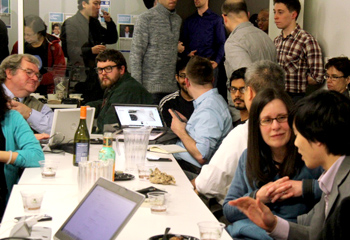
At the close of a recent event known as a “hack night,” someone asked Tom Schenk “Who’s deciding how to spend the million?”
Schenk’s in as good a position as anyone to say who should spend the $1 million Bloomberg Philanthropies purse, but as director of analytics for Chicago Department of Technology and Innovation, he came to this coders’ meet-up to hear suggestions.
This is the kind of informal work that goes on at weekly hack nights hosted by Open City, a group of volunteers that creates apps with publicly accessible data to “improve transparency and citizen understanding of our government,” according to the group’s website. This particular event, held on the 12th floor of the city’s Merchandise Mart building, doubled as a potluck, so Schenk could talk directly to coders, hackers and civic groups over wine and beer — and the occasional dip of pita into hummus.
Other attendees included: urban planners, computer scientists, web developers, transportation experts, economists, Ph.D. students, analysts, physicists, engineers, musicians and health-care workers. An astronomer from the Adler Planetarium even came by —as did reps from the Illinois Department of Transportation and the Federal Emergency Management Agency. Rayid Ghani, the chief data scientist for President Barack Obama’s 2012 campaign presented how he analyzed the networks and interactions between the president’s supporters.
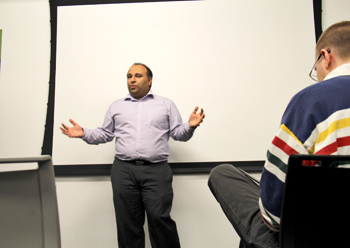
Schenk’s presence reveals how close the ties are between City Hall and the local open government movement; before he was hired by the city, Schenk was a regular hack night attendee himself. And identifying talent — for City Hall and beyond — is still a priority.
“Who else do we need to be able to change Chicago that is not in this room?” he asked people. “What other skill? Who else?”
Walking through the hack night crowd, you could start putting faces to some of the digitally-driven trends in Chicago government; some of these folks — sometimes collectively, sometimes on their own — built software that made it easy to look up lobbyists or interpret zoning maps. Those apps were made possible by Open City’s Paul Baker, Derek Eder, Chad Pry Nick Rougeux and Juan-Pablo Velez.
Eder, Velez and University of Chicago student Forest Gregg also built a site that allows parents to determine which school they should register a child.

Many of these attendees did this work for free.
It’s little wonder, then, that the group followed Schenk closely through the night and laughed after he closed another speaker’s presentation. Projected behind him, a wild-eyed cartoon peered at the crowd and exclaimed ‘RELEASE ALL THE DATA.’
“Chicago has the best, the best, open government community in the world,” Schenk beamed. “There’s no doubt about it, there’s no evidence I’ve seen that says otherwise.”
The “suits” in Chicago’s volunteer data army
The SmartData Platform is just one project initiated by the Department of Innovation and Technology, which was formed after Emanuel issued an executive order mandating city agencies release public records in a manner decided by that department.
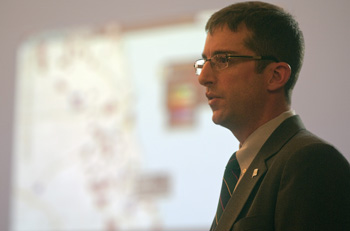
In February, Goldstein addressed an event held at the School of the Art Institute of Chicago. The hall was filled with a crowd not unlike that of hack night, but with fewer hoodies and more suits-and-ties.
“What we’ve done over the past 20 months is probably turned [the data portal] into the biggest open data program that exists,” Goldstein said.
Goldstein delivered his hour-long speech to a packed crowded, which included analysts, developers, officials, academics and scientists.
He outlined how his office streamlined workflow processes to ease the public’s access to information. At the same time, he said, those efforts made departments’ own communication more efficient.
While open data has increased government transparency, the city’s taking this path for another reason: time and money.
Goldstein touted the city’s use of open-source software, which can be cheaper than high-end business solutions peddled by the likes of IBM and Hewlett Packard. The latter, he said, can run in the millions. Streamlining databases allows city employees to quickly search and cross-check records for day-to-day functions.
Goldstein told the crowd that city departments sometimes request information from other departments, only to experience delays thrown up by nondisclosure agreements, among other things.
“How do we deal with this?” said Goldstein. “I can just release data via the portal. It’s then classified as ‘public’ and it’s released.”
This, Goldstein told the crowd, is a “whole different Chicago as it pertains to Daley,” referring to Emanuel’s predecessor.
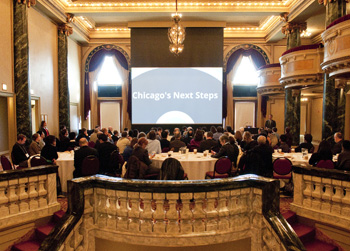
“There are some pretty impressive sets in here,” Goldstein said referring to the data portal site. “One of the ones I’m most proud of is the crimes data set.”
The Chicago crime set Goldstein touted was the only known set of records that lists nearly every reported crime in a major U.S. city, going as far back as 2001 until present.
“So far as I know, this is unprecedented,” he said.
Most municipalities, such as New York, recently profiled by the New York Times for its dive into Big Data, release those records one at a time through a PDF file. This basically holds the data in place. In Chicago, data are released in “machine-readable” formats, so websites, mobile apps and other tools can sip from the sources.
Dan O’Neil, executive director of the Smart Chicago Collaborative and a co-founder of the now-shuttered EveryBlock website, praised Chicago’s crime reporting and didn’t mince words when describing New York’s reporting method — something he contended with while at EveryBlock.
“New York is horrible,” O’Neil said. “They get a lot of credit for broken windows and data-oriented policing, but [not] when publishing information.
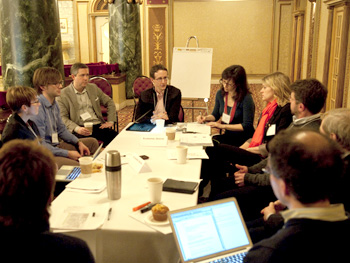
(Editors’ note: WBEZ is a media collaborator with the Smart Chicago Collaborative.)
Over the past year Chicago media organizations and researchers used city data to scrutinize violent crime trends and compare them across all sections of the city. The dataset includes crime categorizations, descriptions, dates, times and location coordinates and more, which is a dramatic contrast to that of New York or Los Angeles, which list recent crimes, but not older ones.
Goldstein’s department stated that it’s striving to automate the process of issuing records from city agencies via a public data portal.
“We put all the data into one place,” Goldstein said, listing off the methods Chicago employed to fulfill Emanuel’s campaign of transparency. “People are surprised when I tell them that the data is not vetted before it goes out the door.”
He got a rise out of the crowd, with an aside: “… And I’m not from Chicago, so I can make these types of jokes. They expect that there’s a little dude in the basement of city hall who sits there and checks it line by line and is like, ‘Oh … we got to redact that one. That’s naughty.’ It isn’t. It’s automated.”
Open Data vs. transparency
City Hall is quick to tout the benefits of a new, data-driven approach to governance. The “City that Works,” as they say, can work even better — and good data will be the lynchpin.
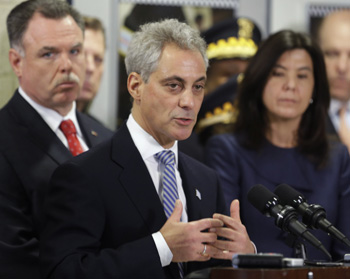
But Mayor Emanuel has detractors when it comes to the issue. They don’t criticize open data, per se, but they challenge whether the city’s only talking a good game when it comes to “Open Gov” or “Gov 2.0.” The gist is that there’s a difference between a government that uses open data and a government that acts transparently.
Mick Dumke, a senior writer for The Chicago Reader, often uses data in his investigative work. He grabs whatever open data he can, but he’s also had to wrangle information from a clinched fist. In one story, he detailed how hard he worked to follow the trail of whom Mayor Emanuel met with after he arrived at City Hall. Dumke’s often resorted to making requests through the state’s Freedom of Information Act, a route that can be tedious, expensive and unfruitful.
“If you want anything that really zooms in on a particular issue, you have to FOIA , you have to go through the research and development department of the police,” he said referring to the crime dataset.
“As great as it is that the city is doing it [issuing open data] … It’s a limited snapshot. It doesn’t tell you anything that’s official.”
According to the data portal’s own disclosure, “The Chicago Police Department does not guarantee (either expressed or implied) the accuracy, completeness, timeliness, or correct sequencing of the information and the information should not be used for comparison purposes over time.”
“I think it has incredible limitations,” Dumke said. “Some of the financial stuff they have is helpful, but there’s a lot of lag time and some of the stuff is out of date.”.
The bottom line?
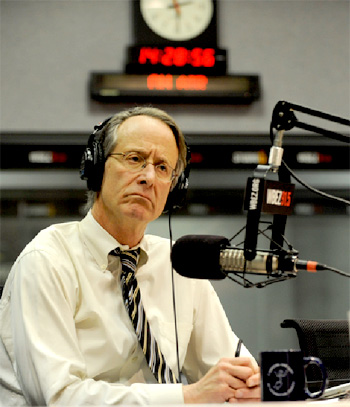
Other seasoned journalists and watchdog groups are considering City Hall’s data rhetoric, too.
Andy Shaw, the current Executive Director of the Better Government Association, is a tad more measured, giving high marks on posting of contracts, bidding documents and the like.
“Let’s give Mayor Emanuel a lot of credit for making more government data available than almost any public official in the country,” Shaw said. “He made this a top priority and they have put up millions of documents online which here therefore were unavailable in an easy manner. To that extent, he gets high marks.”
Still, Shaw said, there’s a surprising amount of tech work left to be done on the city’s website and other tools. “It’s fair to say there needs to be an effort to make it [data] easier to find it, even when it’s there,” he said.
But even Shaw says there’s a distinction between access to data and transparency, and it applies to the mayor’s office as much as anywhere else.
“The criticism that still remains about transparency is that we don’t have any way of knowing how decisions are made,” he said. “It’s very hard to figure out what the mayor does on a day to day basis. It takes FOIAs and a lot of time to get his schedule.”








